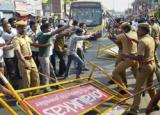Chennai, Jan 30: Miscreants Wednesday attacked with petrol bombs a Tamil Nadu theatre that planned to screen actor-filmmaker Kamal Haasan's film "Vishwaroopam", police said.
"Some miscreants attacked a theatre. However, nobody was injured," a police official told IANS over phone from Ramanathapuram district, where the incident took place. Ramanathapuram is about 310 km from here.
A few movie theatres in the state decided to screen the Rs.95 crore movie on the basis of Madras High Court's late Tuesday night order lifting a state government-imposed ban on the movie, police said.
Theatre owners were asked to present a copy of the court order before screening the movie, forcing them to cancel the show, police said.
Miscreants also burnt tyres outside a theatre here and tore down a movie banner.
In Coimbatore, Kamal Haasan's fans hit the streets demanding that the movie be screened.The espionage thriller, which stars Kamal Haasan, and is written, produced and directed by him, was banned by the state government after some Muslim groups complained that the film portrayed their community in bad light.





Comments
Add new comment